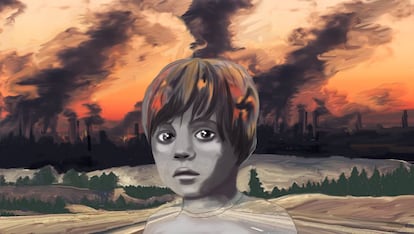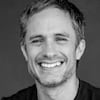Will my child be able to survive on this earth?
Mexican actor, producer and film director Gael García Bernal reflects on the anguish he feels about the climate crisis and the state of the planet his children will inherit

I’ve spent a long time thinking about the first sentence of this column. The beginning has changed as it has been affected by moods and sorrows, which together with age, make this beginning an arborescent chaos. I have to let go to recognize what I want to say. I must find that mythological prickly pear cactus in backlight to draw the different figures that appear on its branches. I had to let go in order to understand and thus constantly create myself. Eventually, I had to accept that there are many beginnings.
This chaos will only make sense once the consequences of patience float back to the earth from which they emerged. Choosing one of them at random: the birth of my first son, Lázaro. Happiness emerged from this in the form of a light that illuminated the path ahead. In addition to feeling the sense of fear that those of us who have children experience, I embraced an idealistic attitude, throwing myself into the act of being a supportive partner and caring for my offspring. I wanted to make the friendliest, most expansive team of all: my family. Luckily — perhaps because I had prepared myself for whatever fate wanted to throw at me — the idealistic side trumped the fearful one.
This position is not free of fear at all. Idealism, on the verge of turning 30, appeared as an echo of how powerful youth is, and how even more powerful it is to know how wrong we are in some of our conclusions throughout life. But that beginning, that commandment that makes us see the future as the only possible reality, encouraged me to keep asking the everlasting question, framed and contextualized in the present: will the earth be habitable for my son when he grows up?
This question — which more and more people seem to be asking — was followed by other related queries: how drastic is climate change? What can I do, individually and collectively, to reverse the damage we have caused? Who is responsible for the majority of pollution? Are other people asking these same questions? Does anyone have the answers?
Many questions emerged over long hours of conversation and pondering while my son slept in that very short time when babies sleep most of the day, rather than at night.
Little is understood about true exhaustion and sleep deprivation until you become a parent. You’re completely exhausted, yet you know that this is the best possible form of insomnia. It is also a luck, a privilege, a way of communicating acidly with the cosmos to say that one is alive. And on those errands, while going to buy the milk that was not needed because nobody drinks cow’s milk in my house, memories came to me of my own moments of courage in life.
“I haven’t drunk Coca Cola since I was 15,” I thought aloud once, as I looked at a picture of a cow on a container of milk. I had made the decision when visiting a town in the Huichol mountains between Nayarit and Jalisco, in Mexico, where there was no drinking water, but there were many bottles of Coca Cola for sale. It was a minor rebellious act — almost insignificant — but it required a lot of discipline. I didn’t mention it to anyone, so as not to have to explain the political reasoning and find myself with a condescending response about the null consequences of my personal boycott. Even back then, I noticed the thin smiles of people who were tired of fighting.
I would read the financial section in the newspaper, to see if the shares of that soft drink company had gone down — any drop in stock price brought me the same satisfaction that one feels when seeing a hated sports soundly beaten. I remembered this as I stared down at the picture of a cow that seemed to laugh at me and follow my gaze, like the Mona Lisa.
I was tired and happy in my first months of fatherhood. All the songs and drawings had a new meaning. All the questions took flight and stayed with me all night, like a tropical storm. Sometimes, I managed to get up to write down these concerns, to see if the calm of the next day could be accompanied by some lucidity that would help me find an answer. But with every answer came 10 more questions. Perhaps that is why the term that began in the Western cultural hemisphere as “ecology” has now become “the climate crisis.”
Every question faces the great glass wall that Gunther Anders described as the supraliminal: in short, it is that which is real but is so big to understand that it sails over words like the atomic bomb or like a great tsunami. It would get to the point where all I wanted was to hear an expert give some optimistic clue about the future. But that clue never came, much less from the experts, who are acting as lookouts for the tragic horizon.
And so, the nights and days passed, merging with each other. Could it be that becoming a parent naturally generates all this questioning? Could it be that now we’re not only wondering about the future of our children, but about the future of humanity as a whole? I feel that, today, we’re asking ourselves terrible questions in response to a call that connects us to the Earth and to everything we perceive.
In a column written in 2014, Eliane Brum gave a name to the modern anguish and anxiety that we human beings feel, and which I am sure are suffered by all living beings as well, now and everywhere. This “21st-century disease” is the alarm that summons us to pay attention to the destruction of all the things that keep us alive. It’s a silent scream — it’s an art to be able to hear it.
Taking care of the Earth and trying to understand the climate crisis has changed my life. It has given me direction, combined with that beautiful and liberating feeling that comes from being a father, when you finally realize that there is someone more important than yourself. Of course, there are many ways to grow up and realize this — I don’t mean to say that being a parent is the only way to achieve such a leap of maturity. But that’s how it happened to me. Or at least, that was a trigger for these concerns that I already held, but which I had never faced.
I close with a phrase that the Hungarian writer Sándor Márai has a character say in his novel, The Last Encounter: “In the end, at the end of everything, one answers all the questions with the facts of one’s life. The questions that the world has asked him over and over again are these: ‘Who are you? What do you really want? What have you really known? What have you been faithful or unfaithful to? With what and with whom have you shared yourself, with courage and cowardice?’ These are the questions. One responds however one can, either by telling the truth or lying: that doesn’t matter. What is certain is that, in the end, one responds with his whole life.”
Sign up for our weekly newsletter to get more English-language news coverage from EL PAÍS USA Edition
Tu suscripción se está usando en otro dispositivo
¿Quieres añadir otro usuario a tu suscripción?
Si continúas leyendo en este dispositivo, no se podrá leer en el otro.
FlechaTu suscripción se está usando en otro dispositivo y solo puedes acceder a EL PAÍS desde un dispositivo a la vez.
Si quieres compartir tu cuenta, cambia tu suscripción a la modalidad Premium, así podrás añadir otro usuario. Cada uno accederá con su propia cuenta de email, lo que os permitirá personalizar vuestra experiencia en EL PAÍS.
¿Tienes una suscripción de empresa? Accede aquí para contratar más cuentas.
En el caso de no saber quién está usando tu cuenta, te recomendamos cambiar tu contraseña aquí.
Si decides continuar compartiendo tu cuenta, este mensaje se mostrará en tu dispositivo y en el de la otra persona que está usando tu cuenta de forma indefinida, afectando a tu experiencia de lectura. Puedes consultar aquí los términos y condiciones de la suscripción digital.









































